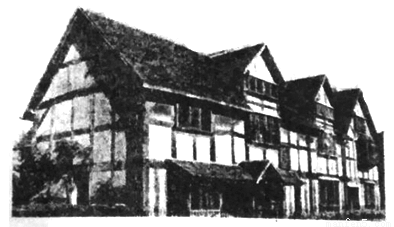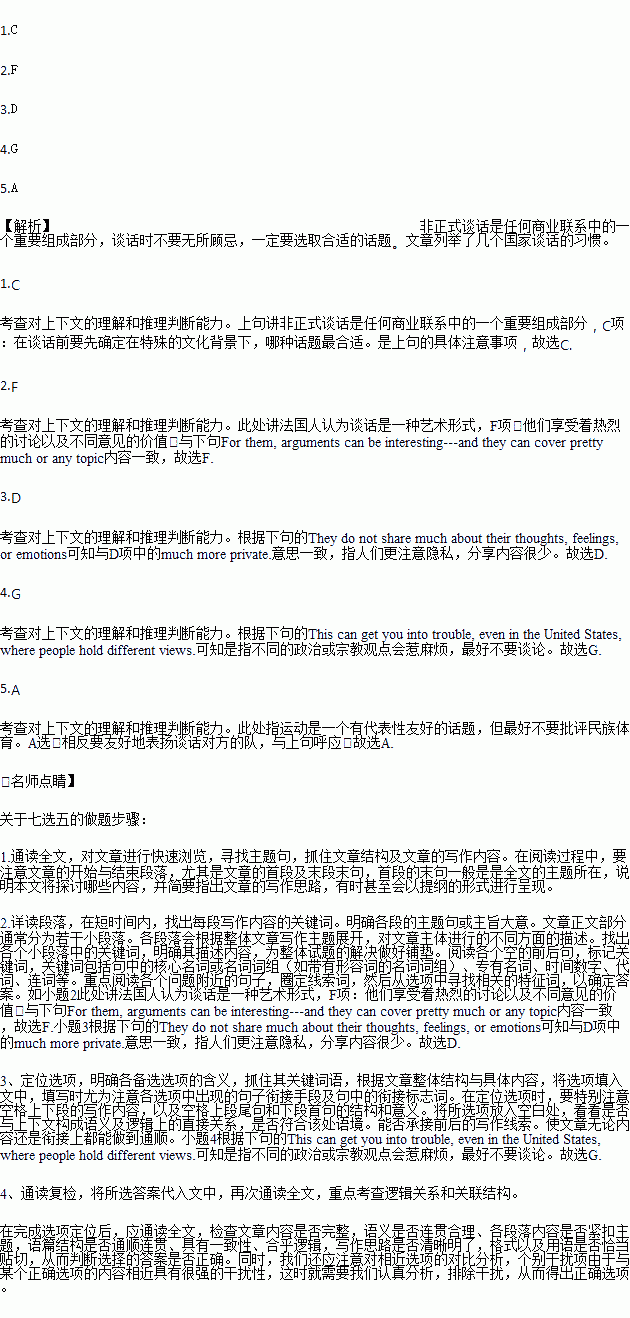题目内容
Informal conversation is an important part of any business relationship. 1.Latin Americans enjoy sharing information about their local history, art, and customs. They expect questions about their family and are sure to show pictures of their children. The French think of conversation as an art form. 2.For them, arguments can be interesting---and they can cover pretty much or any topic---as long as they occur in a respectful and intelligent manner.
In the United States, business people like to discuss a wide range of topics, including opinions about work, family, hobbies, and politics. 3.They do not share much about their thoughts, feelings, or emotions because they feel that doing so might take away from the harmonious business relationship they’re trying to build. Middle Easterners are also private about their personal lives and family matters. It is considered rude, for example, to ask a businessman from Saudi Arabia about his wife or children.
4.This can get you into trouble, even in the United States, where people hold different views. Sports is typically a friendly subject in most parts of the world, although be careful not to criticize a national sport.5.
A.Instead, be friendly and praise your host’s team.
B.You may feel free to ask your Latin American friends similar questions.
C.Before you start a discussion, however, make sure you understand which topics are suitable in a particular culture.
D.In Japan, China, and Korea, however, people are much more private.
E.In addition, discussing one’s salary is usually considered unsuitable.
F.They enjoy the value of lively discussions as well as disagreements.
G.As a general rule, it’s best not to talk about politics or religion with your business friends.
 期末冲刺100分创新金卷完全试卷系列答案
期末冲刺100分创新金卷完全试卷系列答案Shakespeare’s Birthplace and Exhibition

Henley Street, Strafford-Upon-Auon Tel: 01789 204016
Shakespeare’s Birthplace Was the childhood home of William Shakespeare. Take a step back in time and see what life was like for the young Shakespeare growing up in Stratford-Upon-Avon. The house has been exactly furnished, and includes both original and copy items similar to those which would have been there in the house when Shakespeare was a boy. Beautiful painted cloths hang on the walls, brightly colored fabrics fill the rooms and his father’s glove workshop has been recreated. At the back of the house is a beautiful garden containing many plants,herbs and flowers mentioned in Shakespeare’s plays.
The neighboring exhibition shows Shakespeare's life and focuses on many rare local items connected with him, as well as a copy of the first edition of his collected plays published in 1623.
◎Limited disabled access
◎Many restaurants close to Shakespeare’s Birthplace
◎Town center parking
◎Gift shop
◎Allow at least 45 minutes to visit the house and the exhibition
Adult£6.70 Child £2.60 Family£15.00 | ||||||
Summer | Mid | Winter | ||||
Jun--Aug | Apr—May Sep---Oct | Nov----Mar | ||||
Open | Last Entry | Open | Last Entry | Open | Last Entry | |
Monday--Saturday | 9:00 am | 5:30 pm | 10:00 am | 5:00 pm | 10:00 am | 4:00 pm |
Sunday | 9:30 am | 6:00 pm | 10:00 am | 5:30 pm | 10:30 am | 4:00 pm |
1.What can we see in Shakespeare’s birthplace?
A. Old furniture. B. Ancient restaurants.
C. Colored gloves. D. Shakespeare’s plays.
2.How much would they pay if a couple with their two children visit the exhibition?
A. £18.6. B. £15.
C. £13.4 D. £5.2
3.What is the deadline to enter the exhibition on Friday in July?
A. 6:00 pm. B. 5:30 pm.
C. 5:00 pm. D. 4:00 pm.

